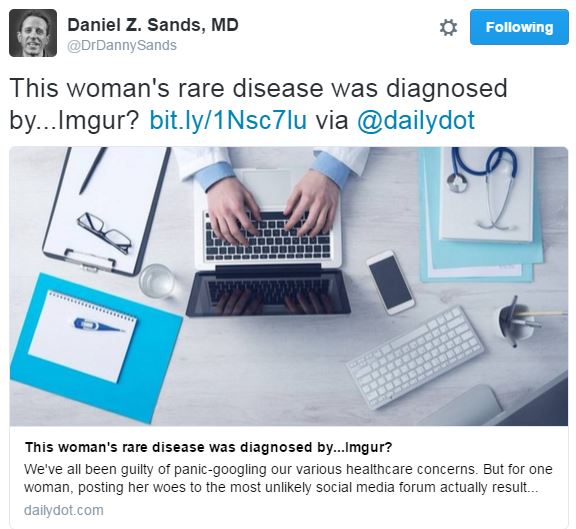 The times, they are a-changin’: medicine is realizing there can be gold found on the internet, amid all the garbage that’s also there. Items:
The times, they are a-changin’: medicine is realizing there can be gold found on the internet, amid all the garbage that’s also there. Items:
- In 2014 a European government started buying Google Ads telling patients “Don’t Google it, check a reliable source.” Why is that an either-or?? Smart e-patients do both! This is a good use of taxpayer money??
- In 2015 there was a big (and much deserved) reaction against the coffee mug that said “Don’t confuse your Google search with my medical degree.” Our blog post about it produced numerous stories of activated e-patients adding to – or sometimes correcting – what their clinicians were doing, including some saved lives.
- Last year a big Israeli HMO joined the fray, producing a commercial similar to the Belgian one – they diagnosed a patient in a wheelchair as a “search victim.”
There are two major e-patient / participatory medicine lessons here, which we need to spread:
- It’s wrong – demonstrably wrong – to expect every clinician to know everything. This was a key finding in Doc Tom Ferguson’s e-patient white paper ten years ago.
- It is possible to use the internet to improve outcomes.
On Saturday, SPM co-chair Dr. Danny Sands (my doctor!:-)) tweeted a great counter-example: a woman with a difficult diagnosis who posted pictures on the online image sharing service Imgur. Last I checked, Imgur isn’t licensed to practice medicine, but amazingly, its reach let her connect with countless others across vast distances, and, happily, she found an answer.
The Society for Participatory Medicine works to develop the thinking and spread the word about patient-clinician partnerships. Information on joining, individual or corporate, is on our Join Us page.






Recent Comments